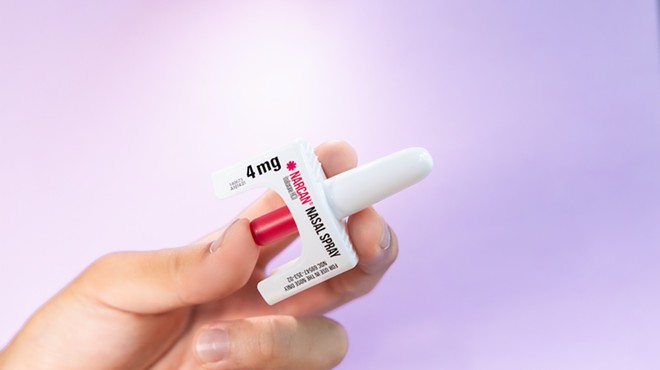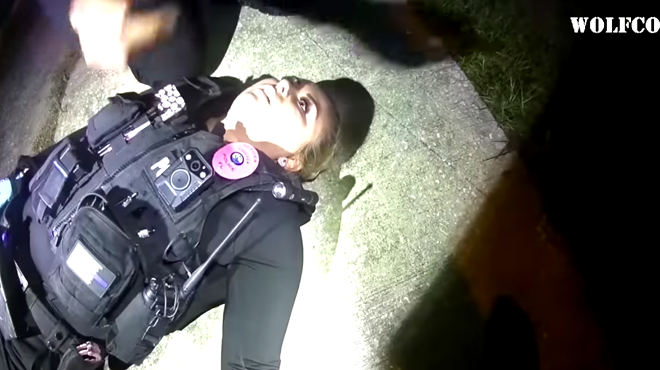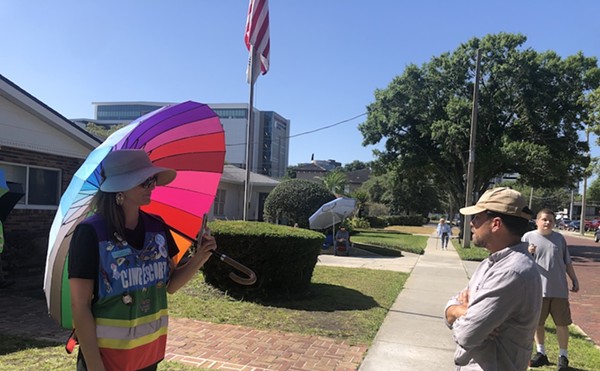Experts say the actual risk for this is “extremely low.” Nonetheless, a wave of misinformation spread through social media, bolstered by questionable accounts of “overdose” by law enforcement officers, is driving a new proposal in Florida that could enhance criminal penalties for people who use or have fentanyl in their possession.
Legislation filed by Republican legislators in the Florida House (HB 231) and Senate (SB 718) would create a criminal penalty, punishable as a first-degree felony, for adults 18 and older who “expose” a first responder to fentanyl or fentanyl analogues (chemically-similar substances), resulting in serious bodily injury.
Under the Florida legislation, “exposure” to fentanyl is defined as causing the ingestion, inhalation, needlestick injury, or absorption of the drug through the skin or mucous membranes.
It’s this last method of exposure — through the skin — that’s eliciting concern from some critics, who note that it is virtually impossible to absorb fentanyl through the skin (save for prescription transdermal patches, which steadily release their fentanyl contents over the course of 36 hours and generally aren’t being thrown at cops).
“Fentanyl and its analogs are potent opioid receptor agonists, but the risk of clinically significant exposure to emergency responders is extremely low,” the American College of Medical Toxicology and American Academy of Clinical Toxicology wrote in a 2023 statement about this myth. “To date, we have not seen reports of emergency responders developing signs or symptoms consistent with opioid toxicity from incidental contact with opioids.”
Fentanyl, a synthetic opioid that’s 50 to 100 times more potent than morphine, is primarily ingested by way of snorting, injecting, or consuming it orally by mouth.
Illicit forms of the drug, generally produced in powder or pill form, have been a key driver in the surge in drug overdose deaths in recent years, both alone and in combination with other substances like heroin and cocaine.
The Florida legislation that would criminalize “exposing” cops to fentanyl appears to stem from questionable clips of police body camera footage, peddled by police departments nationwide, of cops “overdosing” on fentanyl.
Florida Rep. Jessica Baker, the sponsor of this new legislation in the House, admitted during a panel hearing for HB 231 on Wednesday that her legislation was inspired by “a reported increase in law enforcement and first responders having symptoms due to exposure to fentanyl.”
“There is a harm here that needs to be mitigated, and there is an action that needs accountability,” contended Baker, a Jacksonville prosecutor by day who was backed for office by the statewide police unions and Jacksonville firefighters union.
Corporal Robert Palmer, from the Collier County Sheriff’s Office, personally testified in front of House and Senate panels this week in support of the bills. Speaking to lawmakers, Palmer shared his own experience of what he believed to be a fentanyl overdose on duty during a domestic disturbance call last April. Palmer described, at one point, feeling lightheaded, his chest constricting, and his vision beginning to narrow before blacking out.
At no point during public testimony does Palmer explain when or how he was exposed to fentanyl. He says, after he blacked out, fellow deputies treated him with a couple doses of Narcan, a drug that’s capable of reversing an opioid overdose and preventing death. Even after being revived, however, Palmer said he experienced vertigo, dizziness, and had a foggy memory for several days after the alleged exposure.
First responders, he said, are “used to physical threats, being able to see anything that threatens us. Now, it could be something invisible.”
Thing is, difficulty breathing and loss of consciousness are common signs of opioid overdose, but lasting effects of dizziness or vertigo for days after casual exposure are not. Other accounts of “overdose” from have similarly been shared by law enforcement agencies in recent years.
Body cam footage reported by media from a Kansas City, Mo. police department in 2022, for instance, showed an officer collapsing onto the ground, gasping loudly with arms splayed after handling street fentanyl without gloves.
The officer was subsequently treated by fellow officers, who appear to be genuinely panicked, with Narcan. “I felt like I was going to essentially watch my friend die,” one of his colleagues later told KCTV 5, a local news organization.
As the New York Times points out, however, rapid, gasping breaths is not a symptom of opioid overdose either; in fact, it’s the opposite: fentanyl is a powerful sedative that can cause your breathing to become very slow or stop completely in the event of an overdose. Other common symptoms of overdose include loss of consciousness, constricted pupils, cold or clammy skin, and gurgling sounds.
Even a Florida House analysis of the legislation admits that toxicologists have determined that fentanyl is “relatively difficult to transmit through skin contact without a transdermal patch and likely would not remain airborne in sufficient quantities to cause a medical issue if inhaled.”
Medical and toxicology experts have said these “overdoses” caught on police officers’ body cameras are more likely to be symptoms of a panic attack, prompted by concern that they could face the risk of overdose.
Symptoms such as dizziness, or lasting light-headedness, could also be signs of another medical issue, or perhaps even effects of exposure to a different kind of drug. Body camera footage of a police officer in Columbus, Ohio went viral in 2018 after the officer inhaled what he thought was fentanyl. A toxicology report later confirmed it was actually meth.
A 2020 research article on this media phenomenon, published in the International Journal of Drug Policy, identified a 2016 communication from the U.S. Drug Enforcement Administration (DEA) as a key promoter of the myth that overdosing on fentanyl through skin contact was a valid risk for cops.
“A very small amount ingested, or absorbed through your skin, can kill you,” the agency’s acting deputy administrator said in a DEA release that has since been scrubbed from the agency’s website (we found an earlier version of it through the Internet Archives).
“Just touching fentanyl or accidentally inhaling the substance during enforcement activity or field testing the substance can result in absorption through the skin and that is one of the biggest dangers with fentanyl,” the DEA shared.
The agency began to backtrack on this claim in 2018, after its original warning had already disseminated to law enforcement agencies across the country.
Dr. David Nash, cofounder and CEO of IDEM Systems — an Orlando-based company that develops drug detection technology for law enforcement agencies — told Orlando Weekly that these kinds of communications from these larger agencies can be instrumental to spreading misinformation among smaller, local police departments.
“When you have the biggest drug law enforcement agency in the nation saying something like that, you know, it's kind of a no-brainer for a lot of the smaller agencies to follow suit,” said Dr. Nash. Nash, who has an educational background in chemistry, said he’s written to Florida lawmakers over the last week who serve on panels voting on this legislation to express his concerns. He says he hasn’t received any responses.
Palmer, the Collier County corporal who testified in support of the legislation, told lawmakers he knew he recognized that he was supposedly overdosing on fentanyl overdose last April "due to numerous training" he'd received on the risk both through videos and "hands-on training."1. Florida Senate Bill 718 targeting first responder fentanyl exposure will be heard in the Senate Criminal Justice Committee today.
— Dr. David (Nash) (@DrDavid_IDEM) January 23, 2024
Last week I emailed details of my concerns about SB718 to all 8 Senators of the committee in hopes they stop the bill - no reply. I’ll try here. https://t.co/7V4fpOf9HH
Notably, the legislation does not provide, or require, any process for determining whether a first responder — defined as a law enforcement officer, EMT, paramedic, firefighter, correctional or correctional probation officer — has actually overdosed on fentanyl.
This is a problem that’s been brought up by critics already, including Democratic Rep. Mike Gottlieb, a defense attorney by trade, who voted against the bill during a hearing by the House Justice Appropriations committee Wednesday.
“I don't think that there's any way of testing their [first responders'] blood, or giving them a toxicology within the bill to ensure that it was in fact, some kind of fentanyl poisoning or overdose from that situation,” said Gottlieb. “And I think that’s very problematic as a defense attorney.”
The House version of the legislation creates a first-degree felony charge — punishable by up to 30 years in prison and a fine of up to $10,000— for exposing first responders to fentanyl in such a way that results in serious bodily harm. The Senate version would make this a second-degree felony, punishable by up to 15 years in prison and/or up to a $10,000 fine.
The term “serious bodily harm,” however, is vaguely defined. Under Senate Bill 718, the term is defined to refer to “drug toxicity or a physical condition that creates a substantial risk of death or a substantial loss or impairment of the function of any bodily member or organ.”
Jonathan Webber, with the Southern Poverty Law Center Action Fund, told House lawmakers he believes this definition is too broad.
“The term drug toxicity is commonly understood to encompass an extremely broad range of effects from mild symptoms like lightheadedness, to severe symptoms,” said Webber.
A previous version of the Senate version would have also allowed the administration of Narcan by a first responder to be sufficient evidence that another had suffered a serious bodily injury. Sen. Collins, sponsor of the bill in the Senate, later amended the bill this week to cut that part out.
It’s not like people who use or sell fentanyl are able to walk around with the drug anyway. Florida law already criminalizes the possession, sale, and manufacturing of fentanyl, subject to various felony charges depending on the circumstances. In 2023, lawmakers also voted to enhance criminal penalties for unlawful distribution of the drug to someone who later overdoses or suffers “serious bodily harm.”
Democratic Sen. Tina Polsky, during a Senate Criminal Justice committee hearing on the Senate bill Tuesday, expressed skepticism that this new proposal, sponsored by GOP Sen. Jay Collins, was really all that necessary. “Why is adding this other element going to make our law enforcement officers any safer?” she asked.
Simply having fentanyl on hand without a prescription, after all, “is already illegal” Polsky added, “and they should be arrested and charged.”
That's correct; regardless of whether you're dealing fentanyl, or struggling with opioid dependency or addiction (no one messes with fentanyl unless they're prescribed the drug or have an opioid dependency problem, let's be real), you're still subject to face jail or even prison time if you're caught with unlawfully having the drug in your possession.
An amendment tacked onto the bill by Sen. Collins would provide an affirmative defense from prosecution (thus invalidating the charge) if the first responder acted so far outside of the scope of ordinary care generally exercised by a person in their profession that they “caused or substantially contributed to the exposure,” according to a bill analysis.
Polsky was the only lawmaker on the committee to vote ‘No’ on the Senate version of the proposal in a 7–1 vote. Democratic Sen. Jason Pizzo, who similarly expressed concerns during its hearing, nevertheless voted in favor of moving the bill forward.
The House version cleared the House Justice Appropriations Committee, its second committee stop, Wednesday morning in a 10-2 vote, with Democratic Reps. Darryl Campbell and Gottlieb voting ‘No.’ Two other Democrats, LaVon Bracy Davis and Susan Valdes, were absent for the vote.
The bills have received the backing of the Florida Fraternal Order of Police, the statewide firefighters union, and the Office of Attorney General Ashley Moody, with little push-back so far from anyone else.
Both bills need to receive majority approval from the GOP-dominated House and Senate in order to pass. If passed, the legislation would be subject to final approval by Florida Gov. Ron DeSantis, and would go into effect Oct. 1.
Subscribe to Orlando Weekly newsletters.
Follow us: Apple News | Google News | NewsBreak | Reddit | Instagram | Facebook | Twitter | or sign up for our RSS Feed























